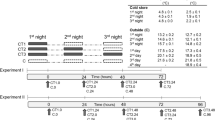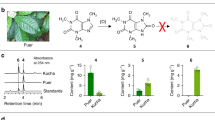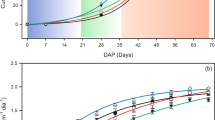Abstract
THE caffeine content of older Coffea leaves decreases after an initial increase in young leaves1. There are two possible explanations of this fact; first, a chemical transformation of caffeine; secondly, a translocation from the leaf to other organs. The object of these investigations was to find out if there is a breakdown of caffeine in the Coffea leaves and what compounds are formed. Four differently labelled caffeine molecules were synthesized, two with 14C in the purine ring (pos. 2 and 8) and two with 14C in the methyl groups (N1-methyl 14C and N7-methyl 14C).
This is a preview of subscription content, access via your institution
Access options
Subscribe to this journal
Receive 51 print issues and online access
$199.00 per year
only $3.90 per issue
Buy this article
- Purchase on Springer Link
- Instant access to full article PDF
Prices may be subject to local taxes which are calculated during checkout
Similar content being viewed by others
References
Wanner, H., Alkaloid-Symposium, Halle (Saale), 1960.
Kalberer, P., Ber. Schweiz. Bot. Ges. (in the press).
Author information
Authors and Affiliations
Rights and permissions
About this article
Cite this article
KALBERER, P. Breakdown of Caffeine in the Leaves of Coffea arabica L.. Nature 205, 597–598 (1965). https://doi.org/10.1038/205597a0
Issue Date:
DOI: https://doi.org/10.1038/205597a0
This article is cited by
-
Tea caffeine: Metabolism, functions, and reduction strategies
Food Science and Biotechnology (2010)
-
Caffeine Biosynthesis and Degradation in Tea [Camellia sinensis (L.) O. Kuntze] is under Developmental and Seasonal Regulation
Molecular Biotechnology (2009)
-
Towards Generating Caffeine-free Tea by Metabolic Engineering
Plant Foods for Human Nutrition (2007)
-
Catabolism of caffeine and related purine alkaloids in leaves ofCoffea arabica L.
Planta (1996)
-
Effect of methylxanthine treatment on rice seedling growth
Journal of Plant Growth Regulation (1992)
Comments
By submitting a comment you agree to abide by our Terms and Community Guidelines. If you find something abusive or that does not comply with our terms or guidelines please flag it as inappropriate.



